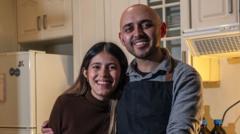Fabriccio Díaz, 28, and his wife Lucía Ramírez, 25, launched Arca Film Lab from their apartment, now serving over 60 clients monthly. Their venture began with a simple Instagram page in September 2023 and has grown remarkably as they provide various film development services, including the intricate E-6 process.
The couple, who taught themselves through online resources and guidance from established labs, notes the rising demand for analogue photography in a region where such services were lacking. "When we started, friends began asking us to develop their films, and it just took off," Lucía recounts.
Their efforts have cultivated an enthusiastic community among younger photographers. Iván Ortiz, 22, cites the nostalgia and distinctiveness of analogue cameras as appealing in a digital world, emphasizing thoughtful photography experiences. Steven López, 33, articulated how using analogue enhances cultural documentation during his travels through Central America.
However, challenges exist. Access to quality analogue cameras and the complexity of importing necessary chemicals for film development can hinder operations. Fabriccio highlights that many labs avoid offering E-6 processing due to the difficulties of acquiring the necessary permits.
Despite these obstacles, Arca Film Lab thrives, maintaining a personal touch with clients that sets it apart from larger, automated operations. "Every client matters to us," Lucía states.
The couple emphasizes their dedication to quality and community, with an adorable addition to the lab: Toto, their four-month-old cat, oversees quality control during the development process. Their goal extends to expanding into El Salvador and establishing partnerships with major film companies to develop cine films in the future.
Enthusiasm for revitalizing cinematography in Central America drives them forward, striving to create a lasting legacy through their labor of love in the analogue photography scene.
The couple, who taught themselves through online resources and guidance from established labs, notes the rising demand for analogue photography in a region where such services were lacking. "When we started, friends began asking us to develop their films, and it just took off," Lucía recounts.
Their efforts have cultivated an enthusiastic community among younger photographers. Iván Ortiz, 22, cites the nostalgia and distinctiveness of analogue cameras as appealing in a digital world, emphasizing thoughtful photography experiences. Steven López, 33, articulated how using analogue enhances cultural documentation during his travels through Central America.
However, challenges exist. Access to quality analogue cameras and the complexity of importing necessary chemicals for film development can hinder operations. Fabriccio highlights that many labs avoid offering E-6 processing due to the difficulties of acquiring the necessary permits.
Despite these obstacles, Arca Film Lab thrives, maintaining a personal touch with clients that sets it apart from larger, automated operations. "Every client matters to us," Lucía states.
The couple emphasizes their dedication to quality and community, with an adorable addition to the lab: Toto, their four-month-old cat, oversees quality control during the development process. Their goal extends to expanding into El Salvador and establishing partnerships with major film companies to develop cine films in the future.
Enthusiasm for revitalizing cinematography in Central America drives them forward, striving to create a lasting legacy through their labor of love in the analogue photography scene.









